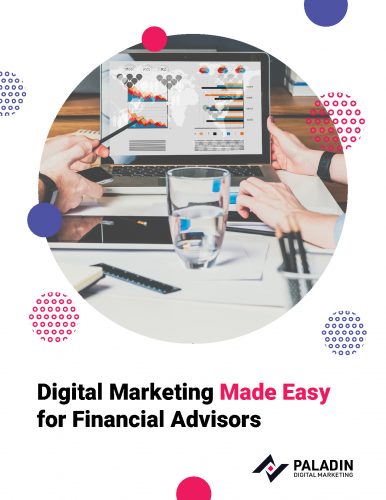Financial Advisors Use Digital Marketing To Build Credibility & Trust

Every financial advisor claims to be a trustworthy expert when they market planning, investment, and risk management services and products to investors. Why would they claim anything less? They know that is what investors want to hear when they select financial advisors.
What happens when these sales claims are exaggerated? This sales tactic creates substantial risk for investors who rely on advisors for their financial well-being. The potential consequences can be catastrophic when investors select the wrong financial advisors.
How have so many advisors gotten away with this aggressive sales tactic for so long? We believe there has never been an easy way for investors to validate the accuracy of their claims.
“Many advisors who use these tactics have exceptional sales skills”
Change is on the horizon. In fact, how investors select advisors is already changing. The Internet enables investors to find and screen advisors without disclosing their identities. This gives investors more control over the process they use to select financial advisors.
At the same time, the Internet is providing a major marketing opportunity for high-quality financial advisors. They can use the Internet to promote themselves and the quality of their advice and services.
“The more investors use the Internet to find financial advisors, the greater the marketing opportunity for advisors who use the Internet to reach investors”
Want more information on this topic? We suggest reading our book: 5 Steps for Selecting the Best Financial Advisor: How the Internet Has Changed the Game for Investors and Financial Advisors
The author of this Guide and Amazon best-selling book is a senior editor and FCMO (Fractional Chief Marketing Officer) at Paladin Digital Marketing. He spent over 20 years in senior marketing positions in the financial service industry.
Paladin is a digital marketing agency that helps financial advisors harness the power of the internet for their firms.
Read our Seven Tips to learn how financial advisors use digital marketing to build online credibility and trust.
Let’s get started.
Professional Website and Online Presence
 A professional, well-designed financial advisor website can provide the first impressions of credibility and trust. Make sure your website is easy to navigate, mobile-responsive, and contains up-to-date information.
A professional, well-designed financial advisor website can provide the first impressions of credibility and trust. Make sure your website is easy to navigate, mobile-responsive, and contains up-to-date information.
It is also fair to say your website is more than a delivery system for information about your firm. One of its primary responsibilities should be converting visitors into qualified leads.
The most important pages include: About Us, What We Do, Who We Serve, Why Select Us, and a Resource Center. The typical financial advisor website has approximately three minutes to communicate information and convert 3% to 5% of visitors into qualified leads.
In addition, consider SEO (Search Engine Optimization) strategies to ensure investors can find your firm when searching for financial advisors online. Several SEO strategies can boost your online credentials: Blog articles, pillar pages, social media, and local SEO, to name just a few.
Paladin Tip: More than 80% of financial advisors have not figured out how to make the Internet their main source for new leads, prospects, and revenue-producing clients.
Quality Credentials and Certifications
 Display your education, credentials, licenses, and certifications on your website. This applies to all of the professionals at your firm. This is a firm’s source of expertise that helps investors achieve their financial goals.
Display your education, credentials, licenses, and certifications on your website. This applies to all of the professionals at your firm. This is a firm’s source of expertise that helps investors achieve their financial goals.
For financial advisors, having designations such as CFP (Certified Financial Planner), CFA (Chartered Financial Analyst), or other relevant certifications can instill confidence in potential clients.
However, there is a good chance you will have to explain which organization issued the certification and what you did to earn it (pre-requisites, study, testing, continuing education). It is a mistake to assume investors will know the value of certain credentials - even CFP®s and CFA®s.
You claim to be a financial expert. Investors want to know where that expertise came from. There are four primary sources:
- Education that produced college degrees
- Relevant experience providing financial advice and services
- Designations and Certifications
- Association memberships that include continuing education.
You may also want to highlight the credentials of teams of professionals, in particular, if they impact the results of your clients. For example, your firm has an Investment Committee with multiple senior professionals. If this applies to your firm, your clients get the best thinking of a team versus the best thinking of an individual - an important distinction.
Paladin Tip: You probably know credentials can be purchased. The advisors who use them are betting investors will not take the time to research them.
Read our blog: Digital Marketing Makes Financial Advisors More Productive
Showcase Client Testimonials
Positive feedback from satisfied clients can speak volumes. Share testimonials, case studies, or success stories on your website. Video testimonials can be particularly impactful as they are more personal and genuine.
Keep in mind astute investors know financial advisors control what is published on their websites. For example, they know advisors will never publish a weak or bad testimonial. Case studies that include Problem-Solution-Result formats may be a better way to describe how an advisor’s services positively impacted particular clients.
Subject to the policies of your compliance department, online ratings and reviews can be more impactful than testimonials because financial advisors have less influence over what clients say when they post reviews.
Paladin Tip: A large number of 5-Star ratings could make your firm more marketable on the Internet.
Read our blog: Google SGE and Your Financial Advisor Website
Provide High-Value Content

Consistently produce and share high-quality, relevant content such as blog posts, pillar pages, guides, videos, podcasts, and webinars. This not only showcases your knowledge but also provides actionable information for your audience. Topics can range from financial planning tips to market analysis.
Churning out large volumes of mediocre content for SEO purposes is no longer a viable marketing practice based on search engine business policies. In fact, this practice could actually backfire and reduce your online visibility.
There is too much competition from brand names to produce visibility for relatively generic, competitive financial keywords. Your best practice is to publish high-quality content that addresses the pain points of your ideal types of clients.
Paladin Tip: Advisor content has to meet all of Google’s content marketing requirements to achieve page one visibility.
Read Our Blog: SEO and AI Trends in Financial Advisor Digital Marketing
Practice Transparency
You should be upfront about your fees, how you're compensated, and any potential conflicts of interest. A fiduciary duty, where you pledge to always act in your client’s best interests, can also be a strong sign of trust.
For example, you may describe your firm as a fee-only, financial fiduciary. The broader message is investors can trust your firm because you are a financial fiduciary who works for fees. Once again, you may have to explain why this is important to investors. For example, fees are paid by clients. Commissions are paid by third parties. The latter increases the potential for conflicts of interest.
You may not be comfortable publishing your fee schedule on your website - 90% of financial advisors do not do that. However, you may be comfortable publishing how you are compensated. For example, you are paid an asset-based fee for an investment management service or a fixed subscription fee for a planning service.
Excluding important information can be a mistake, particularly when your key competitors provide the information on their websites. It is easy to make a shortlist of your more successful competitors and audit their websites for types of disclosure and other relevant information.
Paladin Tip: Very few investors have any idea how the fiduciary standard will protect them. Advisors will have to describe how fiduciary is the highest ethical standard in the financial service industry.
Read our blog: Will AI Improve The Future Performance Of Financial Advisor Websites?
Engage on Social Media

Active engagement on platforms like LinkedIn, Twitter, or even niche financial forums can establish your presence and authority in the field. Sharing content, answering questions, and participating in discussion groups can demonstrate expertise and project a willingness to share knowledge that benefits others. You may even become a thought leader.
Social media for financial advisors is also the ideal forum for building awareness for your brand. For example, many financial advisors use networking to produce new leads for their services. Social media can be the ultimate form of networking.
Paladin Tip: The more visible advisors are, the easier it is for investors to trust what they say about their firms and the professionals who work there. A lack of online visibility can be a source of concern.
Provide Webinars or Online Workshops
 By hosting free or paid webinars or online workshops on financial topics, you can directly engage with potential clients and answer their questions in real-time. This also showcases your knowledge and how you address important financial topics with your clients.
By hosting free or paid webinars or online workshops on financial topics, you can directly engage with potential clients and answer their questions in real-time. This also showcases your knowledge and how you address important financial topics with your clients.
It pays to remember that credibility and trust are built over time. Being consistent in your online interactions, offering value, and demonstrating transparency will go a long way in proving your trustworthiness and expertise as a financial professional.
Paladin Tip: Any service or communication that establishes you as an expert in your field is a major plus.
Conclusion
You already know financial advisors work in one of the most competitive industries on earth. In fact, hundreds of thousands of professionals market themselves as financial advisors, whether they are fee-only fiduciaries or not. At a minimum, this can create confusing choices for millions of investors.
The problem is exacerbated when considering the broad range of financial advisor quality. At one end of the spectrum are advisors with advanced degrees, high-end certifications (CFP, CFA), and decades of relevant experience. At the other end of the spectrum are commission-only sales representatives who are new to the industry, and they all claim to be financial advisors.
It is up to investors to know the difference. Unfortunately, only a small percentage know how to determine the quality of financial advisors. Consequently, they may unknowingly select the advisor with the best personality, sales skills, or marketing presentation.
Paladin believes the Internet will be a game changer for millions of investors. They will finally have a way to find financial advisors and screen them while maintaining their anonymity. Then they will use email or text to contact the ones they want to talk to.
The Internet is the investor/advisor crossroads that makes all this possible. Digital marketing is how financial advisors build online visibility so they are easy to find and generate traffic for their websites.
Updated 10/16/2021




